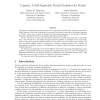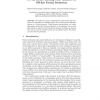143 search results - page 5 / 29 » Abstract Interpretation and Partial Evaluation in Functional... |
LOPSTR
1992
Springer
13 years 10 months ago
1992
Springer
We present a self-applicable partial evaluator for a large subset of full Prolog. The partial evaluator, called Logimix, is the result of applying our experience from partial eval...
JFLP
2002
13 years 6 months ago
2002
We present a practical partial evaluation scheme for multi-paradigm declarative languages combining features from functional, logic, and concurrent programming. In contrast to pre...
ESOP
1998
Springer
13 years 11 months ago
1998
Springer
Abstract. We study the notion of binding-time analysis for logic programs. We formalise the unfolding aspect of an on-line partial deduction s a Prolog program. Using abstract inte...
CORR
2002
Springer
13 years 6 months ago
2002
Springer
The so called "cogen approach" to program specialisation, writing a compiler generator instead of a specialiser, has been used with considerable success in partial evalu...
CORR
2002
Springer
13 years 6 months ago
2002
Springer
Program specialisation aims at improving the overall performance of programs by performing source to source transformations. A common approach within functional and logic programm...


